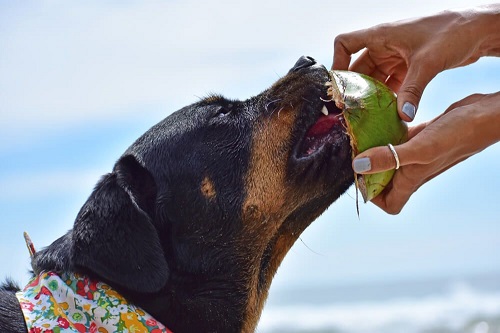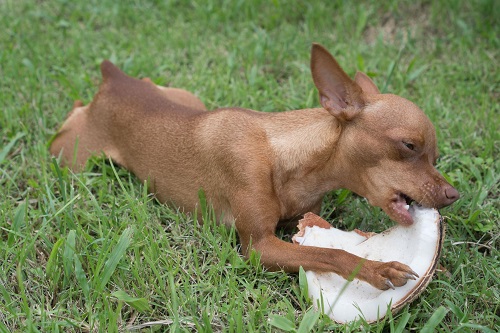Can Dogs Eat Coconut? If you are not sure but want to give them as treat, then you are at the right place! We have all the details for you!
Can Dogs Eat Coconut? If you have this question in your mind and are not sure whether you can feed this tropical delight to your pooch, then keep on reading to get the answers!
What is a Coconut?

A coconut is a large, oval-shaped fruit that grows on the coconut palm tree (Cocos nucifera), which is native to tropical regions around the world. Coconut has a hard, fibrous outer shell, a layer of white meaty flesh, and a clear liquid called coconut water inside.
Coconuts are a versatile fruit that is used in many different cuisines and products and are also used for their oil and other health benefits.
Can Dogs Eat Coconut?
So, Can Dogs Eat Coconuts? Yes, they can eat coconut in moderation and as part of a balanced diet. It is not toxic to dogs and can provide some health benefits. Coconut flesh (the white part inside the coconut) is a good source of fiber, protein, and healthy fats.
Coconut oil can also be a beneficial addition to a dog’s diet, as it can improve skin and coat health, aid in digestion, and boost the immune system.
Is Coconut Safe For Dogs?
Coconut is generally safe for dogs to eat in moderation. It is not considered toxic to canines and can even offer some health benefits. It’s also important to remove the hard outer shell before giving coconut to dogs, as it can pose a choking hazard.
If your dog has never had coconut before, monitor them closely for any signs of an allergic reaction and consult with your veterinarian if you have any concerns.
Health Benefits of Coconut to dogs

Coconut can offer several health benefits to dogs when given in moderation as part of a balanced diet. Some of the health benefits of coconut for dogs include:
- Improved digestion: Coconut flesh is a good source of fiber, which can aid in digestion and promote regular bowel movements.
- Healthy skin and coat: Coconut oil is rich in medium-chain fatty acids, which can improve the health of a dog’s skin and coat. It can help reduce inflammation, prevent dryness and flakiness, and promote a shiny, healthy coat.
- Boosted immune system: Coconut contains lauric acid, which has antimicrobial and antiviral properties that can boost a dog’s immune system and help fight off infections.
- Better brain function: Coconut oil contains medium-chain triglycerides (MCTs), which can provide a source of energy for the brain and improve cognitive function in dogs.
- Anti-inflammatory properties: Coconut oil contains antioxidants and anti-inflammatory compounds that can help reduce inflammation throughout a dog’s body, including in their joints.
A Few Health Concerns
While coconut can offer several health benefits to dogs, there are also a few health concerns that dog owners should be aware of. Some of the potential health concerns of dogs for coconut are:
- High-fat content: Coconut is high in fat and calories, which can lead to weight gain and digestive issues if given in excess. Dogs with pancreatitis or other digestive disorders may have difficulty digesting high-fat foods like coconut.
- Choking hazard: The hard outer shell of the coconut can pose a choking hazard to dogs. It’s important to remove the shell and break the coconut into small, manageable pieces before giving it to your dog.
- Allergic reactions: While the coconut is not a common allergen for dogs, some dogs may have an allergic reaction to it. Signs of an allergic reaction can include itching, hives, swelling, and difficulty breathing.
- Risk of diarrhea: Introducing new foods to your dog’s diet can sometimes cause digestive upset, including diarrhea. It’s important to introduce coconut gradually and in moderation to avoid digestive issues.
- Increased calorie intake: Coconut is high in calories, which can contribute to weight gain in dogs if given in excess. It’s important to factor in the calories from coconut when determining your dog’s overall daily caloric intake.
How to Feed Coconut to Dogs?
- Start with small amounts: When introducing coconut to your dog’s diet for the first time, start with small amounts and monitor your dog’s reaction. Gradually increase the amount over time.
- Choose fresh coconut or unsweetened coconut products: Avoid sweetened coconut products, as they often contain added sugars that can be harmful to dogs.
- Remove the hard outer shell: Always remove the hard outer shell of the coconut, as it can pose a choking hazard to dogs. Break the coconut into small, manageable pieces before giving it to your dog.
- Incorporate coconut into your dog’s diet: Coconut can be given as a treat or mixed into your dog’s food. You can sprinkle coconut flakes on top of your dog’s food, or mix a small amount of coconut oil into their food.
- Watch for signs of digestive upset or allergic reactions: Monitor your dog closely for any signs of digestive upset or allergic reactions when introducing coconut to their diet. Signs of digestive upset can include vomiting, diarrhea, and decreased appetite, while signs of an allergic reaction can include itching, hives, swelling, and difficulty breathing.
- Consult with your veterinarian: Before adding any new foods to your dog’s diet, it’s important to consult with your veterinarian to ensure that it is safe and appropriate for your individual pet.
How Many Coconuts Can a Dog Eat in a Day/ Week/ Month?
As a general guideline, it is recommended that dogs receive no more than 10% of their daily caloric intake from treats or other supplemental foods. For an average 50-pound dog, this equates to approximately 250 calories per day. One cup of shredded coconut contains approximately 283 calories, so it’s important to factor in the calorie content of coconut when determining how much to give your dog.
Treats & Recipes of Coconut for Dogs

Here are some treat and recipe ideas for incorporating coconut into your dog’s diet:
- Coconut bites: Mix together unsweetened coconut flakes, coconut oil, and peanut butter, then roll into small balls and refrigerate until firm. These can be given as a tasty, healthy treat for dogs.
- Coconut smoothie: Blend together unsweetened coconut milk, frozen banana, and a tablespoon of coconut oil for a delicious and nutritious smoothie that your dog will love.
- Frozen coconut treats: Mix together unsweetened coconut milk, plain yogurt, and mashed banana, then pour into silicone molds and freeze until firm. These frozen treats make a great summer snack for dogs.
- Coconut oil popcorn: Pop plain popcorn and toss with melted coconut oil and unsweetened coconut flakes for a crunchy and flavorful snack for dogs.
- Coconut banana dog biscuits: Mash together ripe bananas, coconut flour, coconut oil, and an egg, then roll out and cut into dog-bone shapes. Bake at 350°F for 20-25 minutes until golden brown.
Quick Takeaways
So, Can Dogs Eat Coconuts? Dogs can safely consume fresh coconut, coconut oil, coconut flakes, and coconut milk, and treats and recipes using coconut can be a tasty and nutritious snack for dogs. However, it’s important to introduce coconut gradually and in small amounts to avoid digestive upset or weight gain.
As always, it’s recommended to consult with a veterinarian before adding any new foods or supplements to a dog’s diet to ensure their safety and suitability for the dog’s individual needs.
